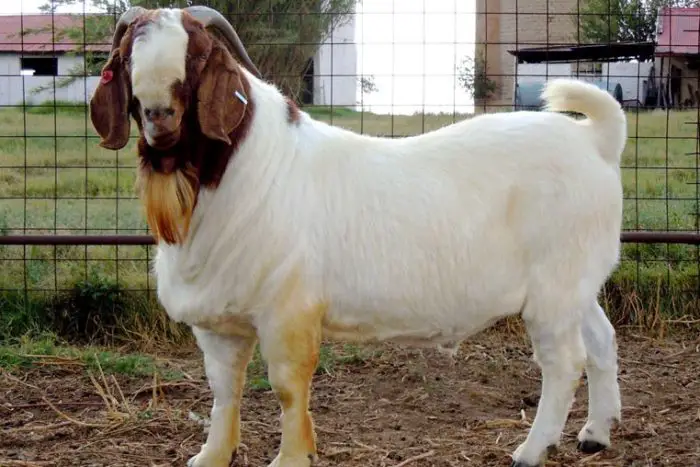We shall be looking at goats, specifically Boer goats – they are well acclaimed for their superior attributes. The scientific name for Boer goats is Capra aegagrus hircus. On average, goats have a life span that ranges from 15 to around 18 years. Interestingly, the life spans of Boer goats vary. Some say that Boer goats can live for roughly 7 to even 8 years. Then some say that they live for as little as 8 years to at most 20 years. What then is the actual Boer goats’ lifespan? We will discuss that herein and other relevant related details.
Table of Contents
What Are Boer Goats?
A Boer goat is one of the many goat breeds used by goat farmers. Goats are primarily reared for things like meat, milk, fibre and hides. Boer goats are mainly for meat production. The Boer goat breed first came onto the scene around 120 years ago. It is a goat breed that was developed in South Africa. It might interest you to know that ‘Boer’ actually means ‘Farmer’ in Dutch. One of their superior qualities is a high resistance to diseases. This is one of the things that lead to a very long Boer goat lifespan.
How do Boer goats look like? Boer goats usually have bodies in white and heads that have a brown colour. There are of course colour variations as you can find Boer goats that are wholly white or wholly brown. Their ears are quite big and flappy whereas their horns are quite short.
How Do You Determine The Age Though?
If one keeps impeccable records they can easily refer to them to determine the age. If that is not the case you can use the Boer goats’ teeth as the basis. How do you do that? Well, first of all, know that a healthy mature goat has 8 lower front teeth – in case you did not know there is no upper row. When a goat is less than 5 years of age it will have 6 teeth. When it is older than that it will have all 8 teeth.
Advanced age is usually seen through a couple of indicators. The most telling are spaced teeth and or worn out teeth. In some cases some of the teeth begin to fall off when the Boer goats are advanced in age. This information can help you guestimate the age of a goat in general. Ultimately given the basic knowledge of a Boer goat lifespan you can even project how long your Boer goats may live.
Boer Goats Lifespan Depends On How They Are Reared
At the beginning we highlighted that there are variations in terms of Boer goat lifespans. This is a good place to mention also that the lifespans of Boer bucks (males) and does (females) also differ. Typically the does have a longer lifespan that the bucks. On average, Boer bucks can live for roughly 10 or so years whereas the does live for 15 or more years. Yes there is that aspect of high resistance to diseases. However there are things regarding how goats are kept that lead to either shorter or longer lifespans. We shall explore that a bit later on in this article. First off let us look at breeding for moment.
Breeding Is The Start Point
Extending Boer goat lifespans or ensuring they live long starts off with breeding. If the breeding stock is poor quality then the less desirable attributes will be passed on to the offspring. When choosing breeding stock it is important to ascertain that you are picking the best there is. It is best to source from reputable suppliers than to deal with uncertain or unclear sources. None of what you will do later on will positively impact the Boer goat lifespan if the breeding stock was substandard to begin with. If it is ascertained that the breeding stock are pure bred and are fertile then you are good to go. Remember it is the bucks (the male ones) that more important because it is their characteristics that are passed onto the offspring.
Housing Considerations
The lifespan of Boer goats depends hugely on how their housing is put together. Ventilation is a big deal for Boer goats if they are to grow well and live longer. The housing should allow for a dry environment and also sufficient protection against wet natural weather elements such as rain or drizzle. If these conditions are not adhered to the Boer goats might become susceptible to diseases. Once diseases set in or there are general deteriorations in living conditions then Boer goat lifespans get threatened. Proper ventilation and a clean, dry environment have been found to lead to longer Boer goat lifespans.
Initial Separation When Introducing New Boer Goats
This might sound trivial but in the long run it can lead to improved Boer goat lifespans. Here is what happens, let us suppose you want to increase your capacity. Let us say you bring in one more or several more Boer bucks to mate with does you already have. Imagine the implications of introducing a new buck that probably has a disease. It can end up spreading it to the rest of the herd. To avoid such occurrences you must initially keep the new ones separately. If you do this for roughly a month that will give you time to ascertain that they do not have any issues of concern.
Venturing into goat farming with a particular focus on Boer goats is most advisable. They are hardy which means they can thrive in virtually any environment. They are also highly resistant to diseases as we touched on earlier. The Boer goat lifespan is also considerably long which enables the farmer to enjoy several years of production (for instance, breeding purposes). As we discussed it is vital to pay attention to a number of things for the lifespan of the Boer goats to be long. Aside from the favourable Boer goat lifespan, their market price is quite good. When selling breeders, a Boer goat that was purely bred can cost US$300 or more.

